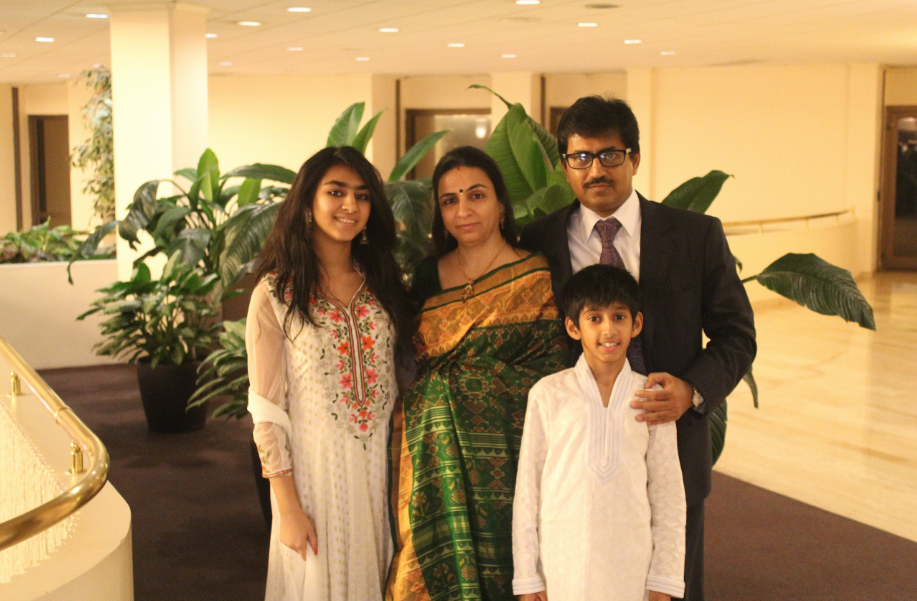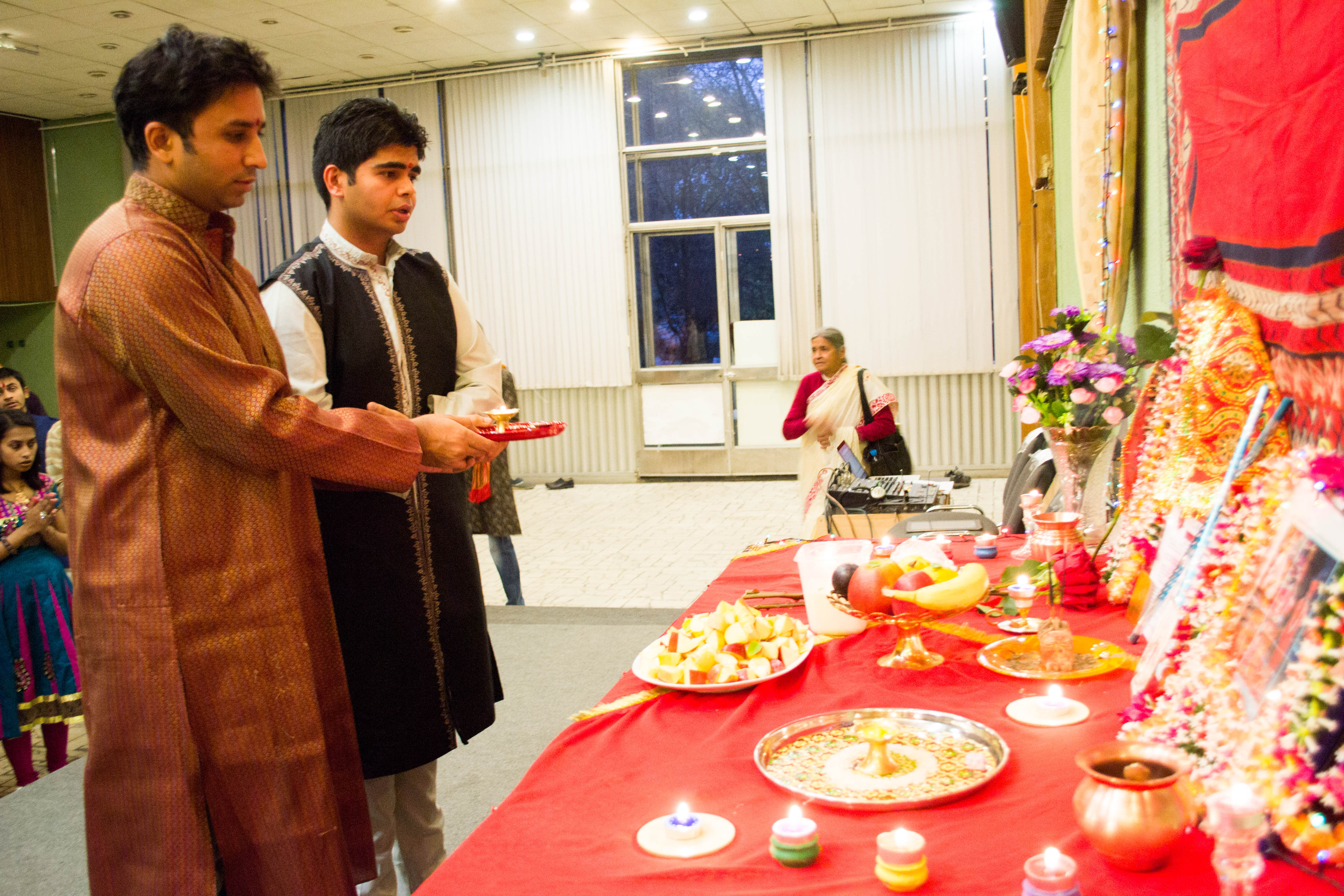
Dharmendra Raval with his family.
Personal archiveGujaratis, who hail from the western state of Gujarat, have historically been considered active, practical and easy-going. The Gujaratis who shared with RIR their experience of adapting to life in Moscow while keeping in touch with their cultural heritage, seem to harbour these very characteristics.
Hitesh Patel came to Russia to start a diamond production unit in 2004 while working for a friend's company. He didn't have any friends or relatives, but business associates and partners helped him acclimatize with the surroundings and to find accommodation and basic information of the city. He says he had also done a lot of research prior to coming to Moscow.
Jigar Jadeja and Dharmendra Raval first arrived in Moscow in 1998, the tough year of a major economic crisis that hit Moscow. That didn’t scare them away though.
Jadeja, who came to Russia to obtain a degree in medicine, says that Russia was completely unknown to him, he had no friends or relatives here, and first few months were really difficult because of a lack of knowledge of the Russian language.“Even basic things like travelling and going to grocery store were a big task,” he says.
 Hitesh Patel (L). Source: Personal archive
Hitesh Patel (L). Source: Personal archive
Raval came to Moscow on a deputation from his company in India just before the financial crisis of 1998 and later started his own business. Although he faced a similar language barrier, a friend who had been staying in Russia for some years helped him with both professional and everyday questions then. Now, Raval feels like he’s been living in Russia forever.
“It has been a pretty long time now. Honestly, I stopped counting after 10 years of my stay in Russia,” he reminisces.
Bridging the mentality gap can make accommodation to life abroad harder.
Hitesh Patel thinks that the mindsets of the Russians of different generations vary significantly, with the older generation preserving a stronger bond with India. “I believe those Russians who have lived most of their life post 1990 are much more inclined towards the western culture. The older generation, especially those from neighbouring CIS countries are much closer to the Indian culture, largely due to Bollywood cinema being more widely screened.”
Jadeja feels there is a vast difference in mindsets between Russians and Indians in general, be it social, cultural or any other aspect of day to day life. “In fact, we Indians differ from state to state culturally, and Russia is a completely different country,” he opines.
Raval, on the contrary, feels people in Russia are similar to people back home in India, being simple at heart, good natured and emotional. “Art connects beyond boundaries!” is the conclusion he makes. “It’s heartening to see Indian children learn the Russian language, ballet and take to its food. On the other hand, I can see numerous Russians learn classical Indian dance forms like Kathak and music and yoga. Bollywood has been an integral part of India’s cultural exchange with Russia.”
Of course, no matter how well-adjusted a person is to life in another country, sometimes homesickness strikes, and everyone has their own way of coping with it. Patel shares that eating Indian food and socialising with his compatriots, visiting Indian gatherings and especially cricket helped him feel more 'Indian' while living in Russia.
Jadeja says that he often feels nostalgic even though he has a family in Moscow, his wife is Russian, and he is accustomed to a Russian lifestyle. But yet he misses each and every thing about his homeland. “Be it the noise, traffic, the heat, unfunctionality of the system, I have no complaints. I mean India is so diverse be it food, people, culture …you never get enough of it. Last but not the least is my parents whom I miss the most and who have done every possible thing for me so that I have the best in life.” He travels to India almost every second month and his family members are very supportive and understanding, and travel with him whenever there is a possibility.
For Raval, the link with India will always stay strong. The wave of nostalgia often sweeps him during the important festivals. “The yearning for our families is even stronger at this time. Diwali, Navratri, Holi are family festivals and we miss India a lot,” he says with a tinge of sadness.
The activities of the Gujarati community keep many members from feeling homesick and lonely.
A small but active community called the Gujarati Samaj meets once in a couple of months. During the summers, the frequency of their meets increases as the Gujarati Samaj organizes nearby tours to Moscow regions over the weekend.
Raval also reckons that the Indian community in the city is closely knit and active. His fellow Gujaratis try to meet as often as they can to celebrate festivals, exchange traditional recipes and generally keep the feeling of home alive. “There’s a saying in Gujarati that means: Wherever lives one Gujarati, there Gujarat is alive,” Raval says with a laugh. “We come together in Moscow for Navratri, perhaps the most widely celebrated festival of the Gujaratis. We celebrate by dancing the raas-garba, soaking in the festive mood and dancing till we can dance no more!”
Jadeja says that Gujarati food is not available, probably because there are not so many Gujaratis in Moscow yet, and most eateries are not specifically focused on cuisine from the state.
But there are many Indian restaurants serving Punjabi/Mughlai and even South Indian food to a certain extent.
Jadeja assesses the quality of Indian food in Moscow: “It’s okay. In fact, taste has gotten better over recent years but still it cannot match to what we get back home.” As far as groceries are concerned, there are a couple of shops and websites where almost everything is available except for fresh Indian vegetables. “What I really like and what we cannot find here in Russia are foods like bitter gourd, ladies finger,” he says.
Patel admits that being vegetarian can be a bit of a struggle in Russia, a country that heavily relies on meat in its daily diet. “We, being vegetarians, find some basic Indian groceries readily available (wheat/rice/dal) but there is a shortage of fresh Indian vegetables.”
In Raval’s opinion, it can be really hard to switch from Indian cuisine to Russian because Russian food is very different from Indian. “Our food has lots of spices, green vegetables, sweet savouries and dry snacks. Merely talking of it makes my mouth water!” He says there are some places in Moscow where a limited number of Indian ingredients can be found but for the most part, his family prefers to buy their food requirements on their visits to India and stock them at home.
“We usually eat at home since there aren’t any Indian restaurants here in Moscow specializing in Gujarati food. When we go out, we try other Indian recipes, international chains and local eateries,” Raval says.
The article was first published in 2014.
All rights reserved by Rossiyskaya Gazeta.
Subscribe
to our newsletter!
Get the week's best stories straight to your inbox